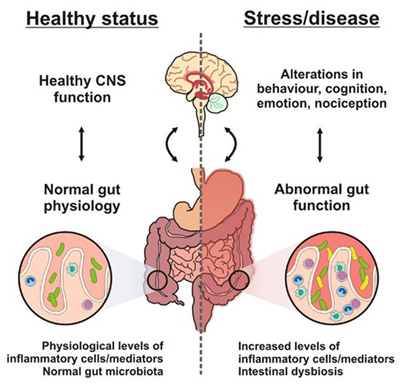
Intestinal bacteria (gut microbiota) and diabetes
![]()
 Emerging research is examining how gut microbiota may contribute to type 2 diabetes risk. Gut microbiota densely populate the digestive tract, playing a crucial role in the normal structure and development of a healthy mucosal immune system and affecting uptake of nutrients, regulation of metabolism, angiogenesis, and development of the enteric nervous system. However, some components can become a liability if they are associated with a genetic susceptibility to certain illnesses. In these circumstances, microflora can contribute to the pathogenesis of various intestinal disorders and have a systemic impact on inflammation.
Emerging research is examining how gut microbiota may contribute to type 2 diabetes risk. Gut microbiota densely populate the digestive tract, playing a crucial role in the normal structure and development of a healthy mucosal immune system and affecting uptake of nutrients, regulation of metabolism, angiogenesis, and development of the enteric nervous system. However, some components can become a liability if they are associated with a genetic susceptibility to certain illnesses. In these circumstances, microflora can contribute to the pathogenesis of various intestinal disorders and have a systemic impact on inflammation.
A large study recently suggested a relationship between the functions of gut microbiota after red meat consumption and an increased risk of cardiovascular disease and cardiac events. The findings support the theory that the gut microbiota may play a major role in metabolic diseases. The investigators found that compared to vegans or vegetarians, patients whose diets included red meat—which is rich in L-carnitine (a trimethylamine)—produced more trimethylamine-N-oxide (TMAO). TMAO is produced from L-carnitine in the human gut by intestinal microbiota and is known to speed atherosclerosis in rodents. In this study, the level of L-carnitine in almost 2600 meat-eating subjects undergoing cardiac evaluation predicted increased risks for cardiovascular disease and myocardial infarction, stroke, or death, but only among subjects who also had high TMAO levels. This finding raised the possibility that gut microbiota may explain at least some of the association between red meat consumption and cardiovascular risk.
Smaller studies have already shown that type 2 diabetes in humans is associated with a different composition of intestinal microbiota compared to nondiabetic persons.In light of findings that intestinal microbiota may differ between patient populations with different metabolic abnormalities, future research will need to find targeted therapeutic strategies for these different patient populations.
Read More
For enquiries info@jothydev.net.
Please visit: jothydev.net | research.jothydev.com | diabscreenkerala.net | jothydev.com/newsletter
